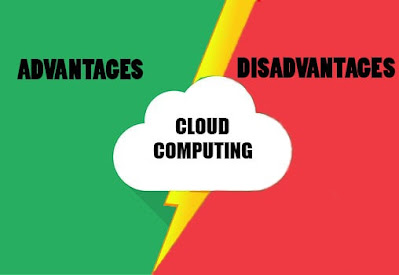 |
What is Cloud Computing ?
Cloud computing is a way of storing and accessing data from the internet. It has the ability to provide access from a remote server. Hence it is made easy for the data to be accessed anywhere in the world.
What is the use of Cloud Computing ?
After a long time usage of a traditional hard drives, cloud computing gave new dimensions for data storage. It is no doubt that cloud computing provides significant advantages over a traditional storage methods. In fact many companies are switching towards cloud for expanding their business.
Apart from that cloud computing has a major impact in our technological life ; it has become a part of our daily life. Despite of showing importance to the users it has its own drawbacks. It is essential to know all of the advantages and disadvantages of cloud computing to know whether it is right for your IT infrastructure.
In this article, let's look at the 5 Advantages and Disadvantages of Cloud Computing | Limitations & Benefits of Cloud Computing. Finally from this post, you will know the pros and cons of cloud computing.
Let's get started,
Advantages of Cloud Computing
1. Cost
The goal of every business organization is to generate maximum revenue as possible while keeping their expenses minimum. Cloud computing paves the way for this. More than any other on premise technology it takes considerably less amount in using cloud computing. Clients have to pay only for what they have used. However cloud offer significant amount of storage space. This is one of the reasons why companies are shifting towards cloud computing. Even small business organizations can easily afford for a cloud computing service. Additionally clients are no longer in need of purchasing disks. Hence there is no any cost for maintenance of the physical hardware. The cost of spending for the storage space can be used by the companies for improving their infrastructure.
2. Speed
Using cloud you can deploy their services quickly enough in few clicks. Due to this the required resources for the system can be acquired in a fraction of minutes. However speed of the cloud will get reduced if the user does other works of downloading files, movies and music with the internet.
3. Accessibility
What makes cloud services more flexible is its accessibility. A cloud computing service ensures that organizations gets the maximum productivity and efficiency by making the data always accessible. The data present in the cloud services can be accessed anytime and anywhere regardless of the machine you are using. Due to this it is made easy for the users to collaborate and access data from multiple locations.
4. Backup
The information present on the cloud computing service is distributed to various servers around the world. Therefore unlike on premise technology, backup is not a time consuming process in cloud services. Once the data is stored inside the clouds, the backup and recovery can be made easily. The process of backing up is a lot simplified for a local user, offering flexible backup solutions.
5. Strategic Edge
With the rise of competition, clients are in need of latest applications to catch up. Cloud computing provides the best edge technology to cope up with the competitors. Hence latest applications can be accessed instantly without spending time on installations.
Disadvantages of Cloud Computing
`. Security
Security breaches are one of the most common problems faced by the organizations. In fact it is one of the biggest concerns in cloud computing. Even though advance security measurements are taken still is risky to store our data in cloud services. Informations present on the cloud are prone to attack since it is always online. Clients should know that whatever the data stored in the cloud is controlled by a third party. Therefore before uploading their confidential data, the users have to trust their cloud service providers 100%.
2. Internet connection dependency
All of the datas present on the clouds are stored in a remote server. Therefore a cloud computing service entirely depends on a network connection. This also means that to acquire the benefits of a cloud service there should be a consistent and fast internet connection. Moreover there is no access to the clouds without an internet connection.
3. Downtime
Downtime is one of the most frequent problems faced when working with a cloud computing service. Even best cloud service providers are facing downtime and outages. Various technical issue such as power loss, weak network connection, data center servicing and overload of the servers can be experienced by the cloud providers. Due to this there can be temporary downtime in the cloud service. Additionally when there is no internet connection you can't get accessed to the clouds.
4. Vendor Lock-in
Switching between one platform to another is one such drawback that hasn't completely evolved. When the clients are in need of shifting from one platform to another, the business organizations has to face some serious issues. Moreover there is no guarantee that applications those were running on the current cloud platform will be supported by the other. Apart from that there can be configuration issues and additional expenses as well. Additionally there can be security and privacy concerns because of the compromises made during migration.
5. Lower bandwidth
Many cloud service providers only provide limited bandwidths. In case if your company exceed the limitation they has to pay an extra charge. Hence clients are in need of planning how they are going to use the given bandwidth. For an ideal usage they should not pack large amount of servers on data centers. However there are few cloud service providers who offer unlimited bandwidths.









No comments:
Post a Comment